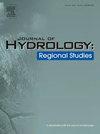Optimized water allocation with managed groundwater recharge and prioritized wetland deliveries to moderate human-nature water use tradeoffs under climate change
IF 5
2区 地球科学
Q1 WATER RESOURCES
引用次数: 0
Abstract
Study region
California, United States.
Study focus
In California, historical water system channelization disturbed the natural water system, making agricultural and wetland deliveries share the same water supply system. Climate change has intensified the competition between agricultural and environmental water uses. In the face of escalated climate change, this study tackles the critical challenge of optimizing water allocation to balance the needs of agriculture and the environment. A landscape-level, implicit stochastic deterministic linear hydro-economic optimization model is used with limited foresight to evaluate the combined impacts of climate change and water management policies on local water allocation decisions in California. The aim is to provide decision-support information for regional water cost-efficient water reallocation for climate change adaptation.
New hydrological insights for the region
Climate change has reshaped water allocation ratios and caused agricultural water use to compromise with environmental water use. In water-scarce regions, the reduction of agricultural water use is most prominent in the wet years of the Mediterranean climate when both agricultural and environmental water use demands are high. The research identified when, where, and how much groundwater recharge benefit is acquired from prioritizing wetland deliveries to inform water use co-benefits and moderate conflicts. Climate change has also increased the overall value and variation across areas in the economic value of water, creating momentum for a cost-efficient market-based water reallocation approach.
在气候变化条件下,通过管理地下水补给和优先湿地输送优化水资源分配,实现人与自然用水平衡
研究区域:美国加利福尼亚州。在加州,历史上的水系渠化干扰了自然水系,使得农业和湿地运输共用同一个供水系统。气候变化加剧了农业用水和环境用水之间的竞争。面对日益加剧的气候变化,本研究解决了优化水资源分配以平衡农业和环境需求的关键挑战。在有限预见的情况下,采用景观水平的隐式随机确定性线性水文经济优化模型来评估气候变化和水资源管理政策对加州当地水资源分配决策的综合影响。其目的是为适应气候变化的区域水成本效益再分配提供决策支持信息。气候变化重塑了水资源分配比例,并导致农业用水与环境用水相妥协。在缺水地区,农业用水的减少在地中海气候湿润的年份最为突出,那时农业和环境用水需求都很高。该研究确定了何时、何地以及通过优先考虑湿地输送来获得地下水补给的好处,从而为水资源利用的共同利益和缓和冲突提供信息。气候变化还增加了水的总体价值和跨地区经济价值的差异,为具有成本效益的基于市场的水再分配方法创造了动力。
本文章由计算机程序翻译,如有差异,请以英文原文为准。
求助全文
约1分钟内获得全文
求助全文
来源期刊

Journal of Hydrology-Regional Studies
Earth and Planetary Sciences-Earth and Planetary Sciences (miscellaneous)
CiteScore
6.70
自引率
8.50%
发文量
284
审稿时长
60 days
期刊介绍:
Journal of Hydrology: Regional Studies publishes original research papers enhancing the science of hydrology and aiming at region-specific problems, past and future conditions, analysis, review and solutions. The journal particularly welcomes research papers that deliver new insights into region-specific hydrological processes and responses to changing conditions, as well as contributions that incorporate interdisciplinarity and translational science.
 求助内容:
求助内容: 应助结果提醒方式:
应助结果提醒方式:


